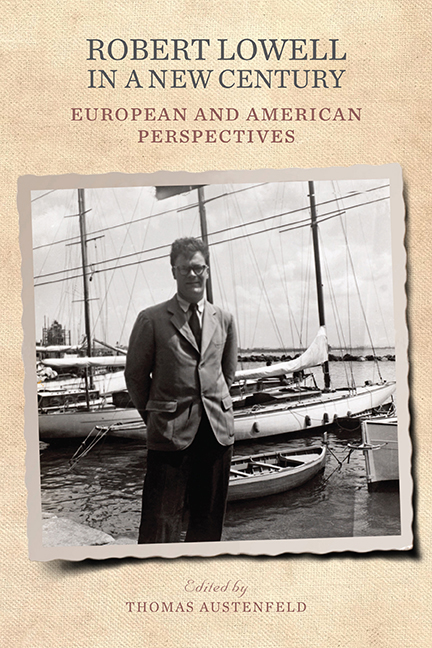Book contents
- Frontmatter
- Dedication
- Contents
- Acknowledgments
- Introduction
- 1 Revisiting Robert Lowell's Mental Hospital Poems
- 2 Sensual Drift and Ethnic Longing in Robert Lowell
- 3 Reworking the Same Water: Robert Lowell Transported
- 4 “Sweet salt embalms me”: A Hippocratic Approach to the Role of the Sea in the Poetry of Robert Lowell
- 5 More Delicate Than the Historian's Are the Map-Maker's Colors: Correspondences between Lowell's Poetics of History and Bishop's Poetics of Space
- 6 Robert Lowell and Ezra Pound's Economics
- 7 Robert Lowell and Ezra Pound in Washington and Rapallo
- 8 “Why Holland?”: Robert Lowell in Amsterdam
- 9 Lowell and Ungaretti: Imitations and Beyond
- 10 Robert Lowell's Credo
- 11 “Marriage? That's another story”: Reconsidering the Marital Trope in Robert Lowell's Poetry
- 12 “Oh No”/“Yes Yes”: Lowell and the Making of Mistakes
- 13 Robert Lowell: The Power of Influence
- Notes on Contributors
- Index
9 - Lowell and Ungaretti: Imitations and Beyond
Published online by Cambridge University Press: 26 June 2019
- Frontmatter
- Dedication
- Contents
- Acknowledgments
- Introduction
- 1 Revisiting Robert Lowell's Mental Hospital Poems
- 2 Sensual Drift and Ethnic Longing in Robert Lowell
- 3 Reworking the Same Water: Robert Lowell Transported
- 4 “Sweet salt embalms me”: A Hippocratic Approach to the Role of the Sea in the Poetry of Robert Lowell
- 5 More Delicate Than the Historian's Are the Map-Maker's Colors: Correspondences between Lowell's Poetics of History and Bishop's Poetics of Space
- 6 Robert Lowell and Ezra Pound's Economics
- 7 Robert Lowell and Ezra Pound in Washington and Rapallo
- 8 “Why Holland?”: Robert Lowell in Amsterdam
- 9 Lowell and Ungaretti: Imitations and Beyond
- 10 Robert Lowell's Credo
- 11 “Marriage? That's another story”: Reconsidering the Marital Trope in Robert Lowell's Poetry
- 12 “Oh No”/“Yes Yes”: Lowell and the Making of Mistakes
- 13 Robert Lowell: The Power of Influence
- Notes on Contributors
- Index
Summary
BY INVITATION OF the Italian House at Columbia University, seventysix- year-old Giuseppe Ungaretti was in New York from February to May 1964, teaching a course on Giacomo Leopardi and four lectures on his own poem “Canzone.” Robert Lowell met him sometime in the middle of April, as he wrote to his good friend and Italian translator Rolando Anzilotti on April 21: “I was reminded of you the other week when I met Ungaretti, hale, blue-eyed, full of gestures and a love of life, as he talked about Blake whom he was translating and writing a book on, and warding off Auden's suggestion that a united Europe was a French scheme.” Ungaretti was not one of the poets (Eugenio Montale, Attilio Bertolucci, Carlo Betocchi, Mario Luzi, Giorgio Caproni) Lowell had met during his Italian tour from the fall of 1950 to the summer of the following year, but they undoubtedly had certain affinities in method and taste. For instance, they shared a need to agonize over their texts, producing endless variants in manuscripts and type drafts, as if the poem could never find its ultimate shape, as well as tweaking their poems after publication. Both poets ultimately viewed their poems only as components of the larger poem of their life: the Life of a Man (Vita d'un uomo), as Ungaretti called the definitive edition of his poetry, or the “verse autobiography,” as Lowell described his Selected Poems. It may not be a coincidence that both poets produced a translation of Jean Racine's Phèdre and, late in their lives, singled out Johannes Vermeer as their favorite painter. Alongside three poems by Giacomo Leopardi, ten by Eugenio Montale, and one by Umberto Saba, the Italian section of Lowell's Imitations (1961) includes a remaking—one could almost say a derangement—of “Tu ti spezzasti,” Ungaretti's anguished elegy for the death of his nine-year-old son, Antonietto, one of the most moving poems of his baroque period.
Without overstating the importance of Lowell's New York meeting with the older Italian poet, in this essay—which makes available for a larger English and American audience two Lowell texts published so far only in the Florentine literary magazine Paragone—I want to offer a closer look at Lowell's “imitations” of Ungaretti and to consider their possible significance for his own original poetry.
- Type
- Chapter
- Information
- Robert Lowell in a New CenturyEuropean and American Perspectives, pp. 117 - 130Publisher: Boydell & BrewerPrint publication year: 2019



